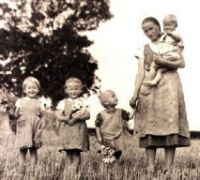|
|

| |
| |
For almost two decades
. . . Udo Erasmus has dedicated his time to understanding
the effects of fats and oils
on human health, as well as the nature of health itself.
Most of his more recent days have been spent on the road,
spreading the message about this largely misunderstood,
but vitally important, subject. He has written two ground
breaking books: Fats and Oils, and Fats That Heal Fats
That Kill, and has recently completed his third, The Right
Fat Diet. |
|
| |
|
|
| |
|
| |
 |
Early
Origins
Having survived the first world war, the horrendous Bolshevik revolution,
and the depression that followed, Gerhard and Senta Erasmus left their
Latvian homeland when communists advanced towards the Baltic countries. Udo
was born during the second world war in Poland, the first stop on his parent's
exodus. With mostly German and Swedish background, they left for Germany
with four small children (one child yet unborn). When
Udo was ten years old, the Erasmus clan left a weary
Europe. As refugees without means or connections, but with renewed
hope, they started life over in Canada, a more peaceful
land with greater opportunity. |
|
| |
Part of Udo's childhood
was spent on 112 acres of bushland in Northern Canada,
without electricity, television, telephone, or radio. It
was here he learned about the wonders of the biological
world and developed a passion for the delicate complexities
of Mother Nature. As a child, he remembers being fascinated
by small spiders negotiating leaves of grass, exploring
abandoned mines with other children, and picking wild strawberries
and herbs. Udo and his siblings helped to tend a large
organic family garden, in which they each had their own
plot to grow personal vegetable favorites: radishes, carrots,
peas, and more. For several years, he built a collection
of skulls taken from dead animals found in nearby woods
and meadows, and on riverbanks.
| During
his first three years in university, Udo worked in
a mining exploration company. He was flown into remote
mountain locations in northern British Columbia by
plane; food was air-dropped in. He took soil samples
for mineralization tests and was issued a rifle for
self-defense against non-vegetarian carnivores! |
|
|
| |
| In school, his favorite
courses were the Sciences, where he learned how things
work, and English, where he especially enjoyed literature
and poetry. Specific interests included biology, environmental
studies, natural history, health and human nature. When
it came time to pursue an education, he chose Life Sciences,
and maintained interests in English as a hobby; interests
which would later turn into a lifelong career. |
|
Udo Erasmus received
his B. Sc. degree in Honors Zoology with a major
in Psychology, followed by graduate studies in Biochemistry
and Genetics
at the University of British Columbia. While he studied
Genetics at UBC, one of his research papers was published
in the peer reviewed journal, Proceedings of the National
Academy of Sciences, in 1967, and two more of his
papers were published in the peer reviewed journal Mutation
Research, in 1971. |
|
| |
A
Major Turning Point
In 1980, life for Udo took a significant turn when
he was poisoned while carelessly
working with pesticides. When medicine was unable to provide help, he concluded
that health was his own responsibility and sought the answers he needed by burying
himself in research literature on nutrition and health. He gave special attention
to the least understood arena: the effects of fats and oils on human health.
This meant finding and perusing thousands of original research studies, many
which were inaccessible to the public and were therefore unknown. Several years
of collecting and reviewing this data culminated in his landmark Canadian best-seller Fats
and Oils. This book also became his thesis and earned him a Ph.D. in nutrition
in 1986. The book is now available in expanded, revised, updated form as Fats
That Heal Fats That Kill. |
|
|
| |
In 1988, he received
his MA in Counseling Psychology from the Alfred Adler Institute
of Chicago (now called the Adler School of Professional
Psychology).
More than 15 years of exploring the practical aspects
of fats has earned Udo Erasmus authoritative status in
the field, as well as the nicknames "The Fatman" and "His
Royal Oiliness".
He pioneered technology
for pressing and packaging fresh oils under exclusion of
light, heat, and oxygen - three main factors which can
transform nutritious oils into toxic ones. Until that time,
oils were highly processed by destructive methods, sacrificing
health benefits in order to attain long shelf life. Originally,
he worked with flax oil, and later added sunflower, sesame,
and other oils to address the main shortcoming of flax
oil - its high omega 3 and poor omega 6 fatty acid content,
which can result in omega 6 deficiency. |
| |
Presently, Udo develops nutritional
formulas to improve both human and animal well-being.
| In addition to essential fats,
he works with phyto-nutrient-rich greens, digestive enzymes,
fiber-rich whole foods, friendly bowel micro-organisms,
herbs, minerals,
vitamins, and antioxidants. |
|
He
also innovates manufacturing methods for maintaining
nutrient quality, and runs a consulting practice for
manufacturing companies in Europe and North America.
|
In his spare time, Udo partakes of one of his
therapeutic endeavors: digital photography. Udo's digital
photography can be sampled at our new display & sales website,
WWW.UGADORY.COM. Have
a peek, sign our guestbook, let us know what you think!
|
|
Personal Growth Involves
Taking Risks! |
|
|
| |
"My
work is an attempt to express the gratitude I feel for what I
have been given."
- Udo Erasmus
|
|


